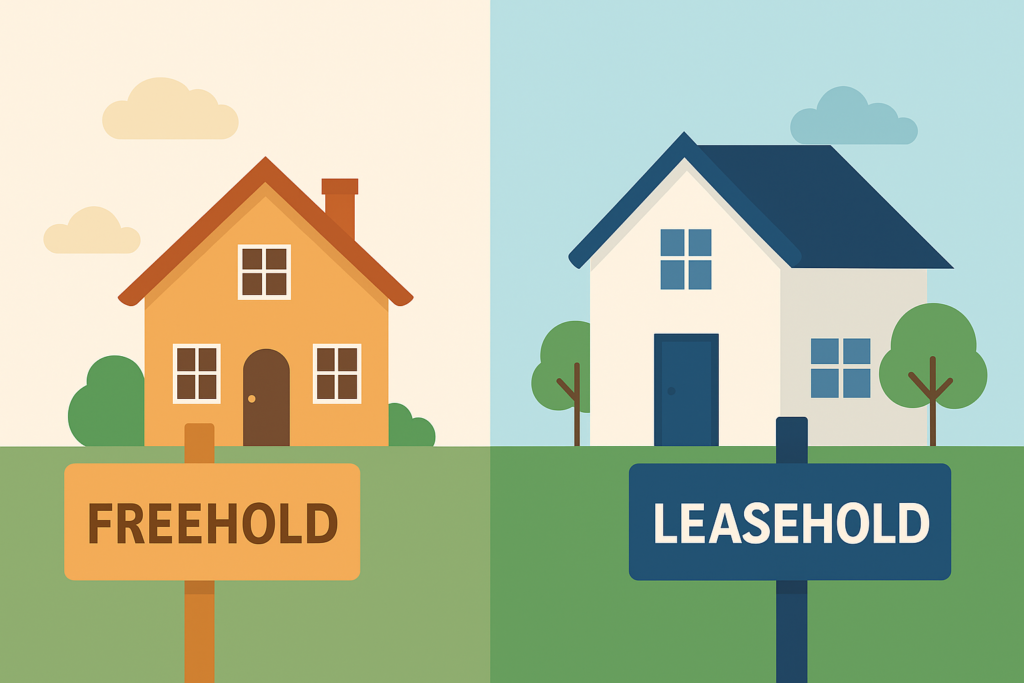
When it comes to investing in real estate, understanding the difference between freehold and leasehold properties is crucial. These two types of ownership have distinct implications—financially, legally, and practically. Whether you’re a first-time homebuyer or a seasoned investor, knowing the pros and cons of freehold and leasehold properties can help you make an informed decision.
Let’s break it down in simple terms so that you know exactly what you’re signing up for.
What Are Freehold and Leasehold Properties?
Before we compare the two, it’s important to understand what each term means.
Freehold Property: Full Ownership
A freehold property means you own the building as well as the land it’s built on—indefinitely. You have complete control over the property, which includes the right to sell, lease, or pass it on to heirs without seeking permission from anyone else.
Moreover, there are generally no annual ground rents or lease renewal fees, which makes freehold properties more appealing for long-term owners.
Leasehold Property: Time-Bound Ownership
On the other hand, a leasehold property means you’re only purchasing the rights to live in or use the property for a specific period—usually 30, 60, or 99 years. You don’t own the land, and once the lease period ends, ownership reverts back to the original landowner (often the government or a developer).
In many cases, leaseholders also have to pay ground rent, maintenance charges, and renewal fees, which can add to the long-term cost.
Key Differences Between Freehold and Leasehold Properties
Now that we understand what these terms mean, let’s explore the core differences between freehold and leasehold properties in detail.
1. Ownership Rights and Duration
- Freehold: You have permanent ownership of both the property and the land.
- Leasehold: You own the property for a fixed term, not the land.
This makes freehold properties more desirable for people looking for complete control and long-term stability.
2. Cost and Investment Value
- Freehold properties usually cost more upfront, but they often appreciate in value better over time.
- Leasehold properties may be cheaper initially but can incur ongoing charges and may be harder to resell, especially if the lease is short.
Therefore, while leasehold might seem budget-friendly at first, freehold often turns out to be the wiser investment.
3. Responsibilities and Restrictions
- Freehold owners handle all maintenance and repair costs but enjoy full autonomy.
- Leasehold owners might have to seek permission for renovations or subletting and may face stricter rules.
If you value independence, a freehold might suit your lifestyle better.
Pros and Cons of Freehold and Leasehold Properties
Understanding the advantages and disadvantages of freehold and leasehold properties can further help in your decision-making process.
Pros of Freehold Properties
- Complete ownership
- No recurring lease or ground rent
- Easier to sell or pass on
Cons of Freehold Properties
- Higher purchase price
- Full responsibility for upkeep
Pros of Leasehold Properties
- Lower initial cost
- Ideal for short-term stays or smaller budgets
Cons of Leasehold Properties
- Limited control
- Potential extra charges
- Lease expiry complications
Which One Should You Choose: Freehold or Leasehold?
It depends entirely on your goals, budget, and future plans.
- If you’re looking for a long-term home with full ownership, freehold properties are likely the better option.
- If you’re seeking a short-term stay or are working within a tight budget, leasehold properties might offer the flexibility you need.
Final Thoughts
In conclusion, the difference between freehold and leasehold properties lies in the level of control, duration of ownership, and financial responsibilities. While freehold property offers permanent ownership and independence, leasehold property can serve as a more affordable entry point into real estate—though with limitations.
Whichever you choose, make sure to read the fine print, calculate long-term costs, and consult a property expert before making your mov

Join The Discussion